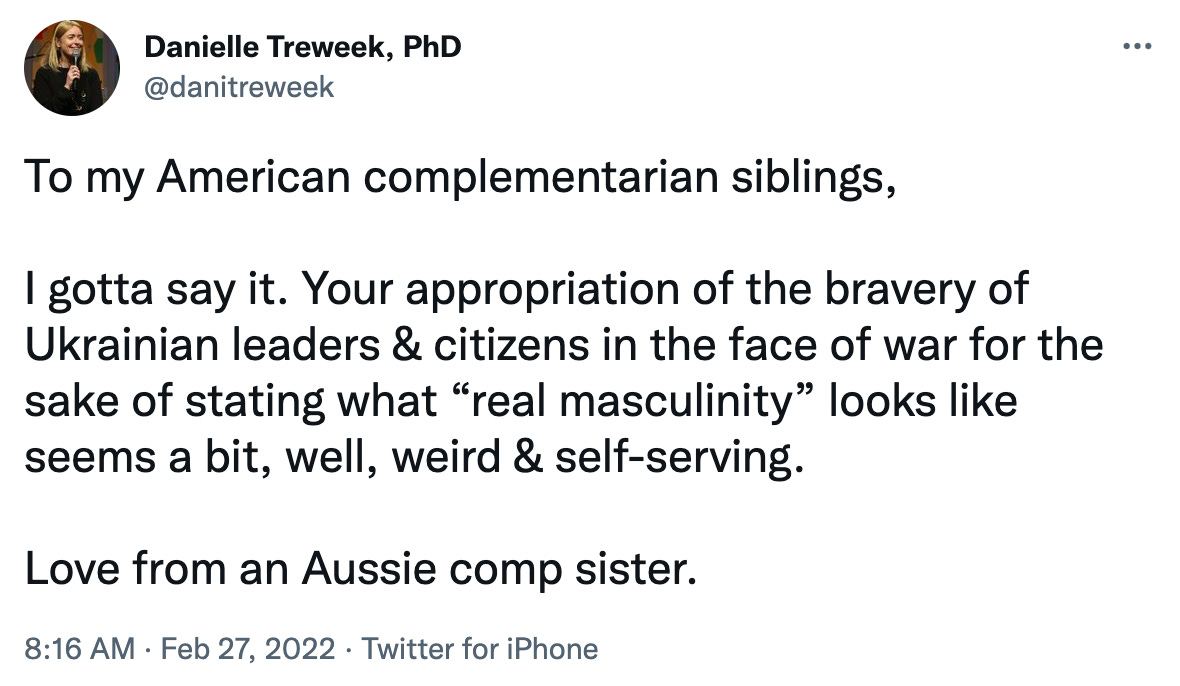Getting Prescriptive about Complementarianism
Or, why jokes about Stockholm Syndrome just really aren't funny
I joined Twitter back in 2012.
Became promptly terrified of its strange ways and even stranger inhabitants.
And then didn’t make a single tweet… until a few years ago when I (very reluctantly) came to realise that if I wanted to develop my theological and pastoral work in the area of singleness I needed to make a deal with the devil (or the bird, as the case may be).
Or at least I thought I didn’t send a single tweet until then.
But recently I realised that I did actually make one tentative foray into the scary landscape of Twitter not long after joining it. That early tweet was a response to a male ministry colleague. It said I was thankful for and appreciated a tweet he made, in which he apologised for having retweeted a poor-form joke about me that someone else had originally tweeted. Confused yet? Yeah, Twitter is a bit like that.
As I reflected anew on that earliest Twitter interaction, I had to appreciate the irony. You see when I decided to give this Twitter-thing a red hot go a year or two back, it was primarily because I wanted to be able to engage with others doing theological work and pastoral thinking in the singleness and sexuality space. What I hadn’t anticipated is just how much I’d be engaging with discussions about complementarianism.
But I should have anticipated it. I should have known.
Why? Well because that poor-form joke that ended up inspiring my first ever tweet was a joke made in response to something I had written. That thing I had written sought to defend the dignity of my complementarian convictions and perspective. The (so-called) joke was that, the thing I had written really just revealed that I was suffering from an acute case of Stockholm Syndrome.
Now, that joke, its retweet, the (accepted) apology from my colleague … it all happened nearly 10 years ago now. Yes, It was poor form. A number of people called it out as such at the time. My colleague recognised that and genuinely apologised for retweeting it. I gratefully accepted his apology. I don’t lose any sleep over it. At least not much.
But, I should have seen it as the portent it was. Because really, here I am, definitely not a victim of Stockholm Syndrome, spending a lot of my current Twitter energies trying to say careful, nuanced, reasoned and challenging things about the controversial topic of complementarianism in 280 characters or less.
Which is why, last week, I gave up and just wrote a really long thread about it instead. A thread that I’ve reposted below (with a little bit of editing and expansion).
Hopefully, I’ll soon start spending more time tweeting about biblical teaching on singleness rather than defending (and at times critiquing certain expressions of) complementarianism. Certainly, as my book publication approaches next year you can expect to see lots of not-so-subtle promotional tweets about it ;)
But in the meantime, below you’ll find something I thought was worth saying (twice) about the state of the contemporary (Twitter) discourse of complementarianism, and what I feel needs to change. Stat.
I'm Complementarian by Conviction.
But I've also grown up in a particular cultural, theological, denominational and pastoral tradition. Specifically, I'm a Sydney Anglican. For those not in the know, the Anglican Diocese of Sydney, Australia has a very strong evangelical history and is typically regarded as being theologically conservative. This means that my particular experience and expression of complementarianism is, in so small part, the result of the teaching, discipleship and examples of my own context.
But so is yours. Let me speak plainly...
Thanks to our algorithmic overlords, a lot of “Down With Complementarianism!” threads appear in my Twitter feed. Most of these threads are authored by Americans. And most Americans who critique complementarianism tend to critique it as they are used to seeing it (or choose to see it) expressed in their own context.
Fine. We all know our individual contexts well. We all have particular insights and reflections to offer into and about them. However, it is incumbent upon all of us to educate ourselves about what is beyond our own view, experience & understanding.
This means we all need to take responsibility for working out if we are actually speaking of something prescriptive of complementarian theology itself, or descriptive of how some (or many) in our own individual contexts practice it.
Prescription vs Description
If something is prescriptive then it is always true of (or about) the being described thing. If something is descriptive then it is true of (or about) the thing being described according to our perception of it in this particular instance.
This means that any comment which seeks to argue that complementarianism “is/does/says/disallows X, Y or Z” is seeking to make a prescriptive statement. This is different to saying that a particular expression or example of complementarianism, or sometimes complementarianism “is/does/says/disallows X, Y or Z”.
If you are going to speak of what is prescriptive about complementarian theology then your "authority" for that is the Danvers Statement. This is the statement which sets out the complementarian theological rationale. It was prepared at a Council for Biblical Manhood and Womanhood meeting in Danvers, Massachusetts, in December of 1987 and published in its final form in 1988.
You know what is not your authority on complementarianism as a theological construct? How individual Christian leaders have chosen to apply, extend or revise the Danvers Statement in their own teaching, context and ministry. In other words, what is descriptive is not necessarily prescriptive. The two things cannot be automatically conflated.
And so, by all means, you should feel free to go to town on Piper, Grudem or any other complementarian whose writing or teaching on the topic you disagree with. Hold them accountable to Scripture and then secondarily to the self-stated prescription of how complementarianism is defined and explicated in Danvers.
But don't be intellectually dishonest & don't over-reach as you do that.
Enough with the Overreach
By that I mean stop making confident, broad-sweeping, wide-ranging, generalisations about complementarianism being/saying/teaching this/that/or the other, when what you are actually describing is just one particular expression of complementarianism (even if that is a widespread expression).
Start telling the the difference between what is descriptive and what is prescriptive.
Consider flipping it around for a moment.
There are some egalitarians who hold that there is absolutely no difference or distinction between men and women whatsoever. There are other egalitarians who hold there are some differences and distinctions between men and women, but that these things don't mean what complementarians take them to mean.
If I was going to critique egalitarianism itself (as a theological construct), it would be both intellectually dishonest and a massive overreach for me to say egalitarianism disallows any notion of difference or distinction between men and women altogether. Because clearly for some, indeed many, egalitarians that is simply not true.
So don't do in critiques of complementarianism what you wouldn't want done in critiques of egalitarianism.
Go ahead and critique specific forms or expressions or examples of complementarianism as they are practised by certain people, churches or denominations. I certainly do at times.
But stop with the generalisations and the over-reach and the blanket statements. Stop with the posting of tweets like these ones:
Such sweeping, overreaching, intellectually dishonest generalisations discredit the author’s credibility as a reliable commentator and critic who is worth engaging with. They demonstrate a lack of charity towards others through mischaracterisation and caricature (anyone know a good joke about Stockholm Syndrome?). They don't serve constructive dialogue and mutual learning.
It's important we have conversations (including critical conversations) about both complementarianism and egalitarianism, because any expression of either needs to be oriented towards love, kindness and human dignity. Where they don't, we need to call it out.
But what we also need to call out is those people who are part of our “tribe” (or who would claim to be somehow aligned with our “tribe”) who go too far, who over-reach, who revert to sweeping generalisations and bad theology rather than nuanced discussion. We don’t have to do it on every occasion. But again, if we are going to be intellectually honest, we need to be ready to do it on certain occasions.
And yes, I do try to practice what I preach.
So, in summary:
Stop getting descriptive and prescriptive confused
Start embracing nuance and complexity
Stop with the acclaim of such over-reaching claims
Start steel-manning rather than straw-manning the other person’s position








Nicely put Danielle, thanks for a clear discussion.